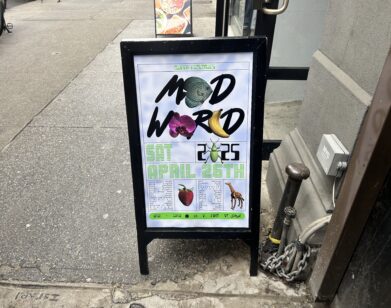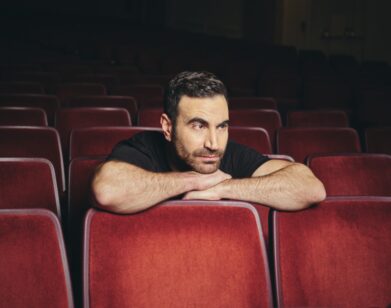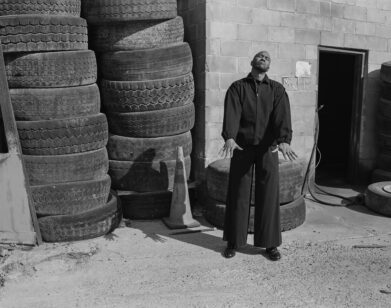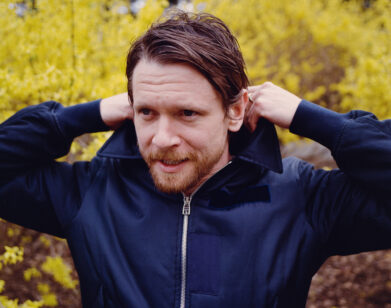James Frey’s Own Personal Jesus
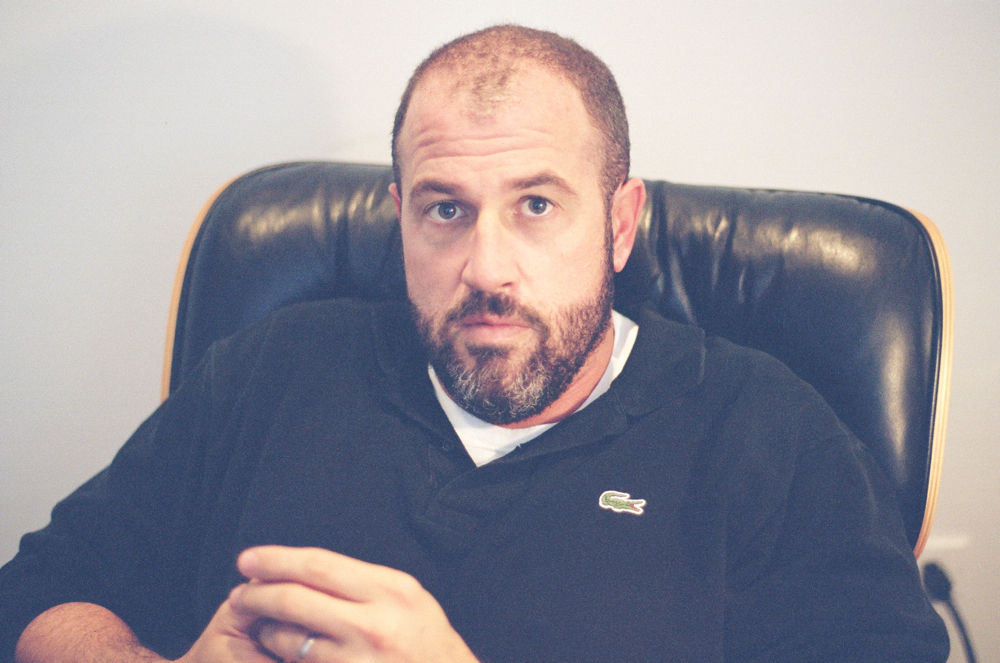
PHOTOS BY JACK SIEGEL
It’s been almost five years since The Smoking Gun called into question the veracity of James Frey’s 2003 “memoir,” A Million Little Pieces, sparking a controversy that came crashing to its climax when Oprah Winfrey berated Frey on her show for misrepresenting his (or his protagonist’s, depending on how much you believe he made up) struggle with overcoming addiction. Some believed it to be a career-ending confrontation; David Carr, writing for The New York Times, described Frey and his publisher, Nan Talese, as having been “snapped in two like dry winter twigs.”
But Frey—who said he originally tried to sell the book as a novel, but was turned down by multiple publishers—carried on, inking a seven-figure deal with HarperCollins in 2007 to write a proper novel, Bright Shiny Morning, and even garnering an apology from Oprah herself. These days, Frey’s diversifying: he’s just finished a new novel, The Final Testament of the Holy Bible, which centers on a contemporary messiah living in New York. He’s working with Mark Wahlberg and Steve Levinson on an HBO pilot about the porn industry. And he currently has a text-based art exhibition up at John McWhinnie—which Charlie Finch, writing for Artnet, said Richard Prince was “second in the door” to see. We visited Frey at his office to discuss these projects, find out what he really thinks about memoirs, and peruse his iTunes.
NATE FREEMAN: You have a lot of new projects; there’s an exhibition uptown—do you want to explain how that happened?
JAMES FREY: It happened because Lisa Dennis and the chairman of Sotheby’s asked me out, and asked if I’d write an essay for their show, and I said yeah. I’ve written for a lot of artists, and I get asked to write about art a lot, so I said yeah, sure. I wrote the essay for her, and then I wanted to do something else with it. And I’ve always said I’m more influenced in what I do by artists, and how they work, how they think, and the freedom they’re given to work and think, than I really am by other writers.
So I started thinking about what else I could do with the piece, and one of the ideas I had was to start transferring what I write directly onto canvas—you know, there’s a long tradition of artists that use words in their work. The easy contemporary examples are Richard Prince or Ed Ruscha or Christopher Wool, each of whom make text-based art. They usually come at it from the other side, where the visualization of the text is as or more important than what the words actually say, and I just thought I could do the same thing—just make it so that the words are actually more important than how they’re presented.
FREEMAN: You’re still working on the book, right?
FREY: Yeah, I have a book coming out in April. I can’t talk really at this point how we’re going to release it, but it won’t be conventionally released, and the way it will be released and presented actually has much more to do with the art world than it does the publishing world.
FREEMAN: But the book itself is called Illumination?
FREY: No, it was originally called Illumination. It’s called The Final Testament of the Holy Bible.
FREEMAN: And it’s about Jesus Christ coming to New York?
FREY: It’s about a guy who might be Christ, or might be the long-awaited Jewish messiah, who is alive and living in New York City. What that person would be like, what would they believe in, how would they live, how would people react to them.
FREEMAN: Was it a struggle to take all these sacred texts, and all this legend and everything, and work it in with the modern New York City in a way that was fresh and didn’t seem forced? How did you reconcile that?
FREY: I just sat down and wrote the book, man. It was a hard book to write, it took a lot longer than any other book I’ve written, but I sat down and wrote it, just like that.
FREEMAN: How do you feel about it now?
FREY: I mean, I dig it. I’m happy with it, I’m glad it’s done. I’ll let people read it and decide what they think of it. It’s irrelevant what I think of it. Once the books are done and they go into the world, I let them go.
FREEMAN: I see you have your iTunes up—do you listen to music while you write?
FREY: Yeah, I listen to music all day.
FREEMAN: Do you switch it up a lot, or is it a very specific canon of stuff that you listen to?
FREY: No, I listen to a lot of shit, man. You can click through and see what comes up. There’s The Plimsouls, do you know The Plimsouls?
FREEMAN: I think so.
FREY: You are too young to know them, maybe?
FREEMAN: Maybe.
FREY: There we would have Pearl Jam, there we would have Cyndi Lauper, there we would have Toto, there we would have Kelly Clarkson, there we would have The Spin Doctors, Elise Meyer, India.Arie, Bette Midler, The Spinners.
FREEMAN: I know The Spinners. And it’s never distracting, listening to music when you write?
FREY: Either listening to music or watching TV, I need noise of some kind.
FREEMAN: And speaking of TV, you have a new project on HBO, right? About the porn industry in LA.
FREY: Yeah, there it literally is.
FREEMAN: Is that something that you have a special knowledge of?
FREY: No, I have no knowledge of it. I spent a week in LA, and I shadowed the CEO’s of two big porn companies, and I met with a bunch of porn agents and directors and writers and producers and a bunch of porn stars, male and female. I certainly learned a lot. No, whatever I knew about it before that week I only knew as an occasional consumer of it.
FREEMAN: What drew you to that world?
FREY: It was Mark Wahlberg and Steve Levinson’s idea. They called me to ask if I was interested in doing it with them. I just think it’s a great world to tell stories in, to tell cool stories: money, sex, fame, and scandal. Those are great subject matters to work with. I also think it’s cool that porn is this huge business that most people in America consume in some way, though they usually do it in secret, and no one really knows anything about it. Nobody knows how it functions, what its people are like, so it’s something no one’s ever done before. I like doing things people haven’t done before. I mean, we have Boogie Nights, and that was it.
FREEMAN: Is there any precursor in literature that might set the tone for what you’re trying to do?
FREY: A precursor in literature… Tropic of Cancer.
FREEMAN: No one has really “swum in the depths” on TV.
FREY: We are going to swim in the deepest depths. We’ll see—the show is a long ways away. I’m literally writing it right now, and any TV show or film is a long process from the words on a computer to sounds and images on a screen. We’ll see what we get to do.
FREEMAN: And once the book comes out, it will be tours and readings and whatnot?
FREY: Don’t know, I think I’m done with tours and readings.
FREEMAN: Exhausting?
FREY: Yeah, I’m married, I have a couple kids, I’ve traveled a lot, I’ve done book tours a lot, I’m happy to stay home and take my kids to school and come to the office.
FREEMAN: It’s a nice office.
FREY: [LAUGHS] Thanks.
FREEMAN: Are you ever going to write nonfiction or memoirs again?
FREY: I never wrote nonfiction or memoirs.
FREEMAN: Well, anything that explicitly is about your past?
FREY: I mean, I don’t know. The next book I’ll write is about Timothy McVeigh.
FREEMAN: Really?
FREY: Yeah. But I don’t know what I’ll do after that. I know the next book I’m going to write will be about Timothy McVeigh. But I don’t ever think about nonfiction or fiction or memoirs. That’s shit that publishers make up to sell stuff, you know? Most books aren’t pure nonfiction or fiction. Memoirs are all as full of shit as mine was. I just write books, I just tell stories. I don’t care what people call them. And for the most part, I’m done letting mainstream publishers release them in ways that don’t make me comfortable.
FREEMAN: Why Timothy McVeigh?
FREY: Because it’s a great American story with a lot of room to work in.
FREEMAN: Do you have any personal connection to the bombings?
FREY: None.
FREEMAN: He hasn’t really been explored at all, I guess…
FREY: There are a number of nonfiction books written, American Terrorist, there are a lot of unanswered questions. And I’m not a conspiracy-theory person, but it was a fucked-up situation that was never really explained, and I just think it would be a great story. I think about what Mailer did with The Executioner’s Song, where he told sort of the “great American story” about crime and murder and death and execution.
FREEMAN: Would you classify or consider your upcoming book a “great American story?” It’s sort of a loaded question.
FREY: I’m not going to classify it as anything. I’ll let people read it and decide what they think. I guess like I say, classifications and all that shit, I’ll let other people worry about that. I’m just going to write my books and do my work and release it. Let the world decide what it is, and if it’s any good or not.
JAMES FREY’S EXHIBITION OF TEXT-BASED ARTWORK, IL DIVINO BAMBINO, IS ON DISPLAY AT JOHN MCWHINNIE AT GLENN HOROWITZ GALLERY THROUGH NOVEMBER 9. FOR MORE ON JAMES FREY, VISIT HIS WEBSITE.


